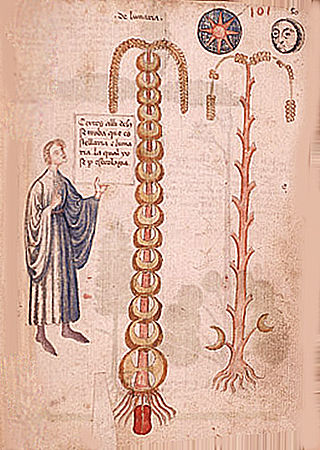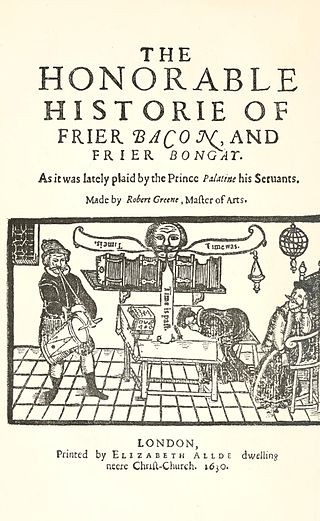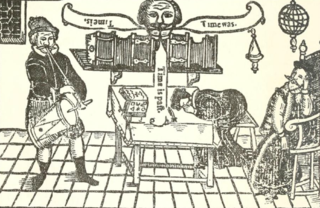Related Research Articles

William of Ockham or Occam was an English Franciscan friar, scholastic philosopher, apologist, and Catholic theologian, who is believed to have been born in Ockham, a small village in Surrey. He is considered to be one of the major figures of medieval thought and was at the centre of the major intellectual and political controversies of the 14th century. He is commonly known for Occam's razor, the methodological principle that bears his name, and also produced significant works on logic, physics and theology. William is remembered in the Church of England with a commemoration on the 10th of April.

Pope John XXII, born Jacques Duèze, was head of the Catholic Church from 7 August 1316 to his death, in December 1334. He was the second and longest-reigning Avignon Pope, elected by the Conclave of Cardinals, which was assembled in Lyon. Like his predecessor, Clement V, Pope John centralized power and income in the Papacy and lived a princely life in Avignon.

John Peckham was a Franciscan friar and Archbishop of Canterbury in the years 1279–1292.

Giles of Rome O.S.A. was a medieval philosopher and Scholastic theologian and a friar of the Order of St Augustine, who was also appointed to the positions of prior general of his order and as Archbishop of Bourges. He is famed as being a logician, who produced a commentary on the Organon by Aristotle, and as the author of two important works: De ecclesiastica potestate, a major text of early-14th-century papalism, and De regimine principum, a guide book for Christian temporal leadership. Giles was styled Doctor Fundatissimus by Pope Benedict XIV.
William of Alnwick was a Franciscan friar and theologian, and bishop of Giovinazzo, who took his name from Alnwick in Northumberland.

Walter Burley was an English scholastic philosopher and logician with at least 50 works attributed to him. He studied under Thomas Wilton and received his Master of Arts degree in 1301, and was a fellow of Merton College, Oxford until about 1310. He then spent sixteen years in Paris, becoming a fellow of the Sorbonne by 1324, before spending 17 years as a clerical courtier in England and Avignon. Burley disagreed with William of Ockham on a number of points concerning logic and natural philosophy. He was known as the Doctor Planus et Perspicuus.
Richard Rufus was a Cornish Franciscan scholastic philosopher and theologian.

Richard FitzRalph was a scholastic philosopher, theologian, and Norman Irish Archbishop of Armagh during the 14th century. His thought exerted a significant influence on John Wycliffe's.
Henry (of) Harclay was an English medieval philosopher and university chancellor.
NicolasBonet was a Friar Minor, philosopher, theologian, missionary and bishop of Malta.

Jean de Roquetaillade, also known as John of Rupescissa, was a French Franciscan alchemist and eschatologist.

Friar Bacon and Friar Bungay, originally entitled The Honorable Historie of Frier Bacon and Frier Bongay, is an Elizabethan era stage play, a comedy written by Robert Greene. Widely regarded as Greene's best and most significant play, it has received more critical attention than any other of Greene's dramas.
Thomas de Rossy O. F. M. was a late 14th century Scottish Franciscan friar, papal penitentiary, bishop and theologian. Of unknown, or at least unclear origin, he embarked on a religious career in his early years, entering the Franciscan Order, studying in England and at the University of Paris.

Peter of Candia, also known as Peter Phillarges, named as Alexander V, was an antipope elected by the Council of Pisa during the Western Schism (1378–1417). He reigned briefly from 26 June 1409 to his death in 1410, in opposition to the Roman pope Gregory XII and the Avignon antipope Benedict XIII. In the 20th century, the Catholic Church reinterpreted the Western Schism by recognising the Roman popes as legitimate. Gregory XII's reign was extended to 1415, and Alexander V is now regarded as an antipope.

John Duns Scotus was a Scottish Catholic priest and Franciscan friar, university professor, philosopher and theologian. He is one of the four most important Christian philosopher-theologians of Western Europe in the High Middle Ages, together with Thomas Aquinas, Bonaventure and William of Ockham.
Robert Colman DD was an English medieval Franciscan friar and university Chancellor.

Thomas Bungay, also known as Thomas of Bungay and formerly also known as Friar Bongay, was an English Franciscan friar, scholar, and alchemist.
William of Nottingham, OFM, was an English Franciscan friar who served as the fourth Minister Provincial of England (1240–1254).
Martin Alnwick or of Alnwick was an English Franciscan friar and theologian.
John of Naples, also known as Giovanni Regina, was a Dominican friar and prominent Thomist theologian and philosopher in the early 14th century.
References
- ↑ Steven John Livesey, Theology and Science in the Fourteenth Century: Three Questions on the Unity of Science from John of Reading's Commentary on the Sentences (1989), p. 76.
- ↑ Parkinson, Anthony (1726). Collectanea Anglo-Minoritica, Or, A Collection of the Antiquities Of The English Franciscans, Or Friers Minors, Commonly Call'd Gray Friers: In Two Parts. With an Appendix concerning the English Nuns of the Order of Saint Clare. Thomas Smith. p. 149 . Retrieved 21 November 2010.
Anno 1335 II. Br. Thomas of St. Dunstan, Br. John of Reading buried at Avignon, Br. John of Yornton, Br. Richard of Drayton buried at Shrewsbury. These were Four of the Oxford Franciscan Regents, or chief Professors mention'd by Mr. Wood, from Eccleston's List: And if I may be allow'd to guess by several of their Juniors being dead sooner, they did not Survive this Year.